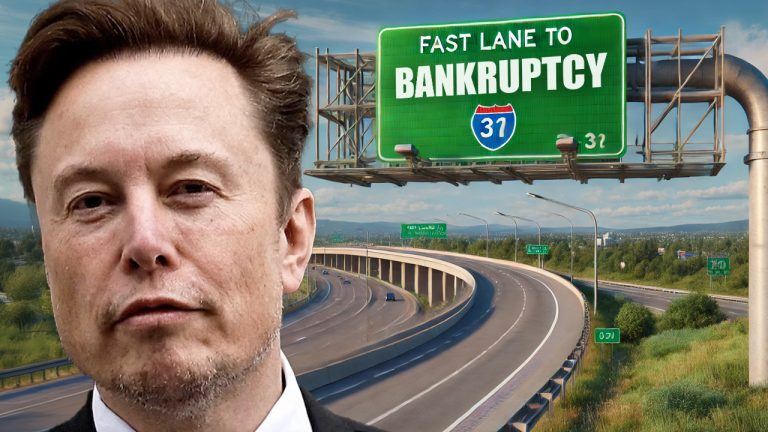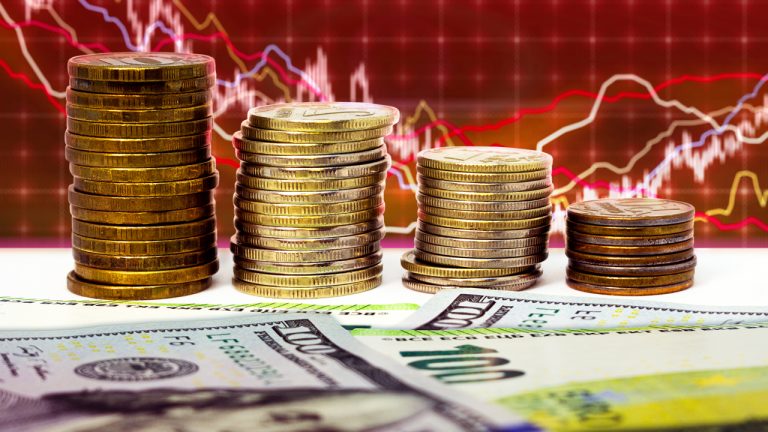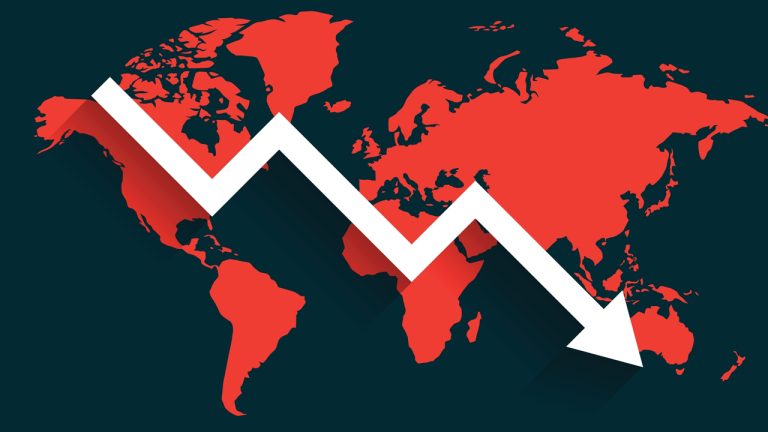 In recent times, Elon Musk, the owner of X and the CEO and product architect at Tesla, Inc., has been voicing his concerns about inflation. This discussion became especially prominent after he interviewed former U.S. President Donald Trump. Just two days ago, Musk took to X, declaring that the United States is “in the fast […]
In recent times, Elon Musk, the owner of X and the CEO and product architect at Tesla, Inc., has been voicing his concerns about inflation. This discussion became especially prominent after he interviewed former U.S. President Donald Trump. Just two days ago, Musk took to X, declaring that the United States is “in the fast […]
The economy is a system of producing and exchanging goods and services in a society.
The economy is a complex system of production, distribution, and consumption of goods and services. Understanding how the economy works can be challenging, but it is essential for making informed decisions about personal finance, investing and public policy.
This article will explore the fundamental concepts of how the economy works, including the factors that influence it and the various components that make up the economy.
The economy is a dynamic system that is constantly changing and evolving. It is a vast network of people, organizations and governments; each involved in creating, moving, and using commodities and services. The economy is influenced by a wide range of factors, including macroeconomic factors like government policies, interest rates and international trade, as well as microeconomic factors such as individual decisions about spending and saving.
Through its policies, the government significantly impacts how the economy develops. Fiscal policy, for instance, describes how the government uses spending and taxation to affect the economy. The government can stimulate the economy or deflate an overheated one using its purchasing power. Taxation is another tool the government can employ to manage the money supply and affect the level of economic activity.
— Fiscal Policy Institute (@NYFiscalPolicy) March 16, 2023
New: Legislature's personal income tax & corporate tax proposals would raise between $1.6 – $2.1 billion:
• Senate & Assembly income tax increase: $710M
• Assembly corporate tax increase: $1.2B for MTA & other transit
• Senate corporate tax MTA surcharge: $930M for MTA pic.twitter.com/zj4gYE319K
The cost of borrowing money is represented by interest rates, which impact both consumer spending and company investment. Borrowing money is less expensive when interest rates are low, which can promote economic growth. High interest rates make borrowing more costly, which can stifle economic growth.
International trade also plays a crucial role in the economy. Trade between countries allows for the exchange of goods and services, which can increase economic growth and efficiency. However, trade can also lead to job losses in certain industries and countries, and imbalances in the trade deficit.
The economy comprises three primary components: households, businesses and government. Each of these components plays a vital role in the economy and interacts with the others in complex ways.
Households are the consumers of goods and services. People use the money they earn from employment or investments to pay for goods and services from companies. Due to the fact that household spending makes up a sizable share of the demand for goods and services, it has a considerable impact on economic growth.
Businesses are the producers of goods and services. To create items and services sold to consumers or other businesses, they employ staff and invest in inputs like raw materials, equipment and technology. Business investment is critical to economic growth since it boosts productivity and creates jobs.
The government plays a crucial economic role through its policies and spending. The government provides essential public goods and services such as education, healthcare and infrastructure, and it also regulates the economy to ensure fair competition and protect consumers.
Several economic indicators are used to measure the health of the economy. These indicators provide insight into the level of economic activity, and can help individuals and policymakers make informed decisions.
GDP is the total value of goods and services produced in a country over a specified period — usually a year. GDP is one of the most widely used economic indicators and provides a broad measure of economic activity.
Public sector debt excluding public sector banks was £2,507.3 billion at the end of February 2023, or around 99.2% of gross domestic product.
— Office for National Statistics (ONS) (@ONS) March 21, 2023
A debt-to-GDP ratio last seen in the early 1960s.https://t.co/eEaU2HoHvy pic.twitter.com/rHvCU9heBg
The unemployment rate is the proportion of the labor force that is unemployed but actively looking for work. It is an important indicator of the labor market’s health and sheds light on the level of economic activity. High unemployment rates indicate a low labor market and a low level of economic activity. In contrast, low unemployment rates indicate a strong labor market and a high level of economic activity.
The inflation rate gauges how quickly the average cost of goods and services is rising across an economy. Several causes, like a growth in the amount of money in circulation or a rise in the demand for goods and services, can contribute to inflation. Low inflation rates might signal sluggish economic growth, whereas high inflation rates can signal an overheated economy.
Related: How to preserve capital during inflation using cryptocurrencies?
The CPI measures the average price of a basket of household goods and services. It is used to track inflation over time and to adjust for changes in the cost of living. The CPI is an important indicator of consumer spending patterns, providing insight into the economy’s health.
#BEFOREandAFTER
— Man In the Middle (@NE1Honest) March 24, 2023
Inflation "Good News, Bad News"
The GOOD NEWS is increases to the Producer Price Index &the Consumer Price Index are slowing!
The BAD NEWS is the CPI is 4 times what it was on Inauguration Day &the PPI is triple!
I.e. Inflation has to fall over 75% for us to… pic.twitter.com/c7Req5JO4J
Retail sales are a measure of the total amount of goods sold by retailers over a specified period. Retail sales can be a good indicator of consumer spending patterns. High retail sales indicate a strong economy, while low retail sales suggest weak economic activity.
Industrial production measures the total output of the industrial sector of the economy, including manufacturing, mining and utilities. It is an important indicator of the health of the manufacturing industry — a critical component of many economies.
The number of new residential construction projects that have started over a specific period is called housing starts. They are a crucial gauge of the housing market’s health and the state of the overall economy. Low numbers of home starts can signify sluggish economic activity, while high levels can suggest significant economic growth.
Blockchain technology has the potential to significantly impact economic growth in several ways. By enabling secure and efficient transactions, reducing costs, and increasing transparency and trust, blockchain can promote innovation, productivity and financial inclusion.
Related: How blockchain empowers women in developing economies
In addition, blockchain-based apps can produce fresh company models and sources of income, stimulating the economy and opening up job prospects. Because blockchain technology is still in its early stages of development and adoption, the total influence of this technology on economic growth has not yet been realized.
Yet, the ability of blockchain to revolutionize many businesses and sectors — from logistics and supply chains to finance and healthcare — makes it a viable tool for promoting economic growth in years to come.

Fiscal policy shapes economies through government spending, taxation and borrowing.
Fiscal policy is a tool used by governments to regulate economic activities in their country. It involves the use of government spending, taxation and borrowing to influence economic growth, stabilize inflation and maintain a stable economy. This article will explain what fiscal policy is, how it works, and why it is important.
Fiscal policy is a tool used by governments to regulate economic activities in their country. It is one of the two main categories of economic policy, along with monetary policy. The main goal of fiscal policy is to control the economy through government spending and taxation.
The government has a number of ways to affect the economy through fiscal policy. One of the primary methods used is government spending. The government may boost economic activity and create jobs by raising spending, which will add more money to the economy.
Another way that fiscal policy works is through taxation. The government can boost disposable income, which in turn can boost consumer spending, by decreasing taxes. This could encourage economic expansion and boost activity.
Important old chart of mine.
— AndreasStenoLarsen (@AndreasSteno) March 18, 2023
Fiscal policy created inflation to a much larger extent than QE pic.twitter.com/zeT5jLqwVA
Finally, fiscal policy is also used for controlling inflation. If the government considers inflation to be a concern, it may raise taxes or cut spending, both of which could help to lower demand and limit inflation.
Fiscal policy is important because it can have a significant impact on the economy. By adjusting government spending and taxation, the government can influence economic growth, inflation and employment levels.
The promotion of economic growth is one of fiscal policy’s main goals. The government can promote economic activity and employment by raising spending. As a result, there may be an increase in tax collections and corporate and individual chances for growth in the economy.
Inflation control is another key responsibility of fiscal policy. When there is an excess of money chasing an insufficient amount of goods, inflation can result in price increases. The government can lower demand by altering expenditure and taxation, which can aid in reducing inflation.
Related: Bitcoin and inflation: Everything you need to know
Furthermore, fiscal policy can be used to reduce unemployment. The government can promote economic activity and employment by raising spending. As a result, there may be less unemployment and more options for employment.
Fiscal policy can also be used to manage government debt. By adjusting government spending and taxation, the government can influence the amount of money it borrows. This can help manage the government’s debt levels and ensure that it is able to meet its financial obligations.
— Fiscal Policy Institute (@NYFiscalPolicy) March 16, 2023
New: Legislature's personal income tax & corporate tax proposals would raise between $1.6 – $2.1 billion:
• Senate & Assembly income tax increase: $710M
• Assembly corporate tax increase: $1.2B for MTA & other transit
• Senate corporate tax MTA surcharge: $930M for MTA pic.twitter.com/zj4gYE319K
Due to their decentralization and lack of centralized management, cryptocurrencies do not have a fiscal policy in the conventional sense. Yet the supply and demand of some cryptocurrencies may be impacted by the fact that they may have their own distinct monetary policies and rules written into their code.
Related: Ethereum as a deflationary asset, explained
For example, Bitcoin (BTC) has a fixed maximum supply of 21 million coins, which is hardcoded into its blockchain protocol. This means that no more than 21 million BTC can ever be created, and this limit helps to regulate its supply and demand.
Even though cryptocurrencies lack a traditional fiscal policy, the rules and protocols incorporated into their coding can nonetheless significantly affect their adoption and value. For instance, alterations to the supply or consensus algorithm of a cryptocurrency may have an impact on its security and scarcity, which may have an impact on its price and market demand.
Magazine: Best and worst countries for crypto taxes — Plus crypto tax tips
 During the Covid-19 pandemic, central banks such as the U.S. Federal Reserve loosened fiscal and monetary policy. Now, these same financial institutions are seemingly engaging in quantitative tightening (QT) practices. According to Nick Gerli, CEO and founder of Reventure Consulting, “the money supply is officially contracting.” This has only happened four times in the last […]
During the Covid-19 pandemic, central banks such as the U.S. Federal Reserve loosened fiscal and monetary policy. Now, these same financial institutions are seemingly engaging in quantitative tightening (QT) practices. According to Nick Gerli, CEO and founder of Reventure Consulting, “the money supply is officially contracting.” This has only happened four times in the last […] Bridgewater Associates’ co-chief investment officer has warned about a recession that is “much more difficult” and “much more painful” than what we’ve been accustomed to. “The dam has been broken where fiscal policymakers are now part of the story,” said the executive of the world’s largest hedge fund. Bridgewater Executive’s Recession Warning Karen Karniol-Tambour, Bridgewater […]
Bridgewater Associates’ co-chief investment officer has warned about a recession that is “much more difficult” and “much more painful” than what we’ve been accustomed to. “The dam has been broken where fiscal policymakers are now part of the story,” said the executive of the world’s largest hedge fund. Bridgewater Executive’s Recession Warning Karen Karniol-Tambour, Bridgewater […] On Jan. 10, 2023, the World Bank published its Global Economic Prospects report, stating that the outlook for the global economy and future economic conditions is bleak. According to the report, 2023 growth forecasts have been cut across the board, with the global economy projected to grow by 1.7% in 2023 and 2.7% in 2024. […]
On Jan. 10, 2023, the World Bank published its Global Economic Prospects report, stating that the outlook for the global economy and future economic conditions is bleak. According to the report, 2023 growth forecasts have been cut across the board, with the global economy projected to grow by 1.7% in 2023 and 2.7% in 2024. […]